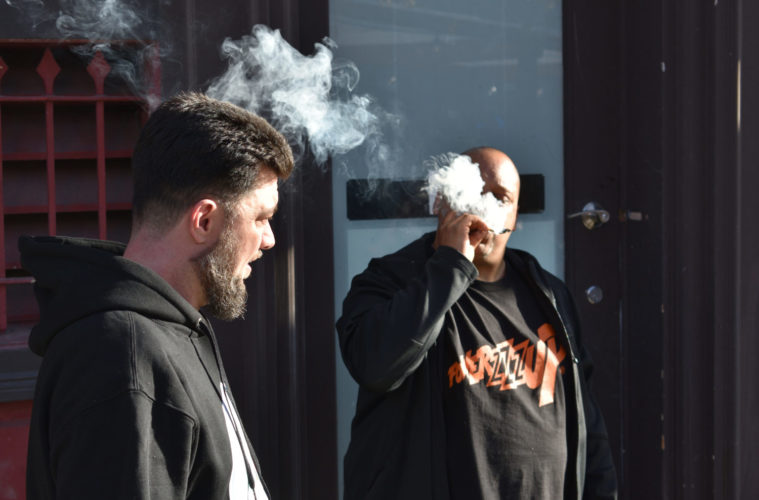As cannabis has become more and more normalized in recent years, a lot of its secrets have come to light. Many of the stories we wanted to hear were told. But for those who have followed the upper echelons of actual exotic genetics (in an age where the phrase has lost some of its magic), there are still a couple of tales left unheard.
One of the greatest – and still untold – cannabis tales is finally coming to light: the story of Cookie Fam elder statesman, Kenny Powers.

I first saw Powers in a old YouTube video where Cookies co-founders Berner and Jigga covered the early history of Cookies genetics, clarifying that Cookies and Cherry Pie had the same parents, and that their famous namesake strain was actually an F1 Durban strain crossed to their prized OG.

Jigga, Berner and Powers [Photo Courtesy of Cookies.]
When I first saw the video, I knew I needed to talk to the guy at the table. Eventually, years later, it came to light that the mystery man was Kenny Powers. It’s not that Kenny was super low-key, more so he’s the kind of person that’ll know you if he wants to know you. Now, he wants L.A. Weekly and its readers to know him.
We met with Powers and his longtime partner, Jason Mejia, a block off of San Francisco’s historic Market Street last week to hear the tale, and of course, smoke some of their newest heat.
We started with how the pair met: Back in the day at a banger thrown by Powers’ cousin. This was nearly 20 years ago; Mejia has now been growing for 15 of them. Not too long after getting his feet wet in cultivation and getting things dialed in, Mejia and Powers would begin to run their first lights together.
“I would always get fire weed from his cousin. His cousin just had the best strains, the best weed around,” Mejia tells L.A. Weekly.
“Yes, because he got it from me,” Powers interjects with a laugh.
“So then when I decided to start messing around, I had just stocked up hella bag seeds,” Mejia continues. “I didn’t have any Durban but mostly Pie and Cookies bag seed. And when I started growing, I started off in a small situation that was one light. Just to try and feed the habit, right? That just turned into two lights and just got addictive.”
Mejia would hunt down info about growing on the web. He didn’t know anyone else that grew when he first got his foot in the door. But these days, things look to have worked out for the self-taught green thumb.
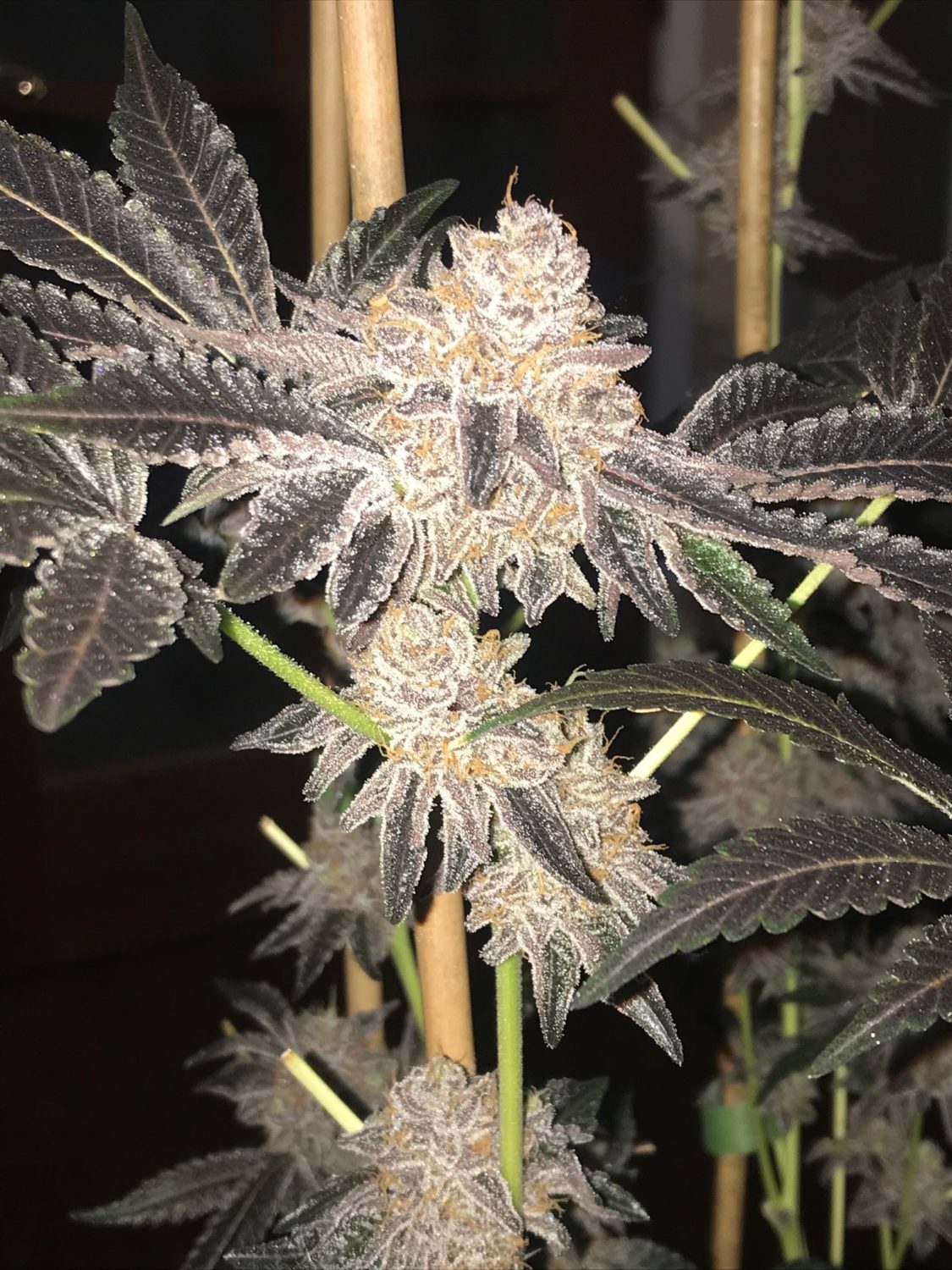
Tuck Her – Unreleased Strain [Photo courtesy of Powerzzzup.]
Mejia went on to explain that as he kept working to dial in his craft and popping bag seeds, he would take everything to Powers for review. He was as critical of Mejia’s cannabis as he is of anything put in front of him to this day.
Eventually, Powers’ tone on the quality of cultivation would change, but the cuts Mejia was working with were still not up to par for his tastes. “Until I finally came with one that was really nice because you know I had no access to cuts,” explains Mejia. “That was Snowman.”
Snowman was a cross between the Thin Mint Cookies and Florida Kush. The Florida Kush was the best OG pheno to hit San Francisco. Powers says it was believed to trace back to the original and was the most expensive ounce he ever bought in his life.
We asked the pair when they felt their priorities shifted from just trying to find that winner pheno to really collecting and pulling together these genetics. Powers says that when he first got in the game in 1988, a year before finishing high school, the idea of growing seemed wild to most in the city. Collecting genetics would have been a baffling concept.
“We knew what exotic was, from just seeing regular green bud and then seeing some of the things that we had access to. My little brother personally had access to the whole Bay Area, where he could go over to Oakland and get some Krypt, or I go up on Potrero Hill and get some Nade. He had to have a bag of Champagne,” Powers tells us. “Not too many people even in the Bay Area had that access. So, we always sat at the kind of hierarchy in the weed game.”
At the time Powers entered the underground cannabis economy of San Francisco it wasn’t famous for dessert terps. There were a lot more people slinging the brownest frown. “Brown, a lot of brown weed during that time. Not as much green there in the scene. It was nothing really that even came with too much of a name,” Powers says.
Powers spoke to what the evolution of cannabis looked like in that first decade, going from high school to seeing Prop. 215 usher in the medical era.
“Well shit, we use to have smoke outs at The Hemp Center,” Powers says with a laugh.
Mejia graduated high school three years ahead of Prop. 215 passing. He remembers the days of waiting for that call back by the payphone after paging your connect.
“I was around some kind of drugs my whole life, but when I first started, everybody was [dope] boys, everybody else didn’t have any [weed] game. … Nobody was really even on the grow game,” Powers says of the early 1990s.
Did he feel isolated in the pack? He didn’t feel like it at the time but looking back he realizes he kind of was.
“When I go back and think about it, [I think] like, ‘Oh shit, I was,’” Powers reminisces.
As cannabis grew more popular, they began to take over former dope spots. Making areas like Page and Webster the go-to spot for buying prime herb.
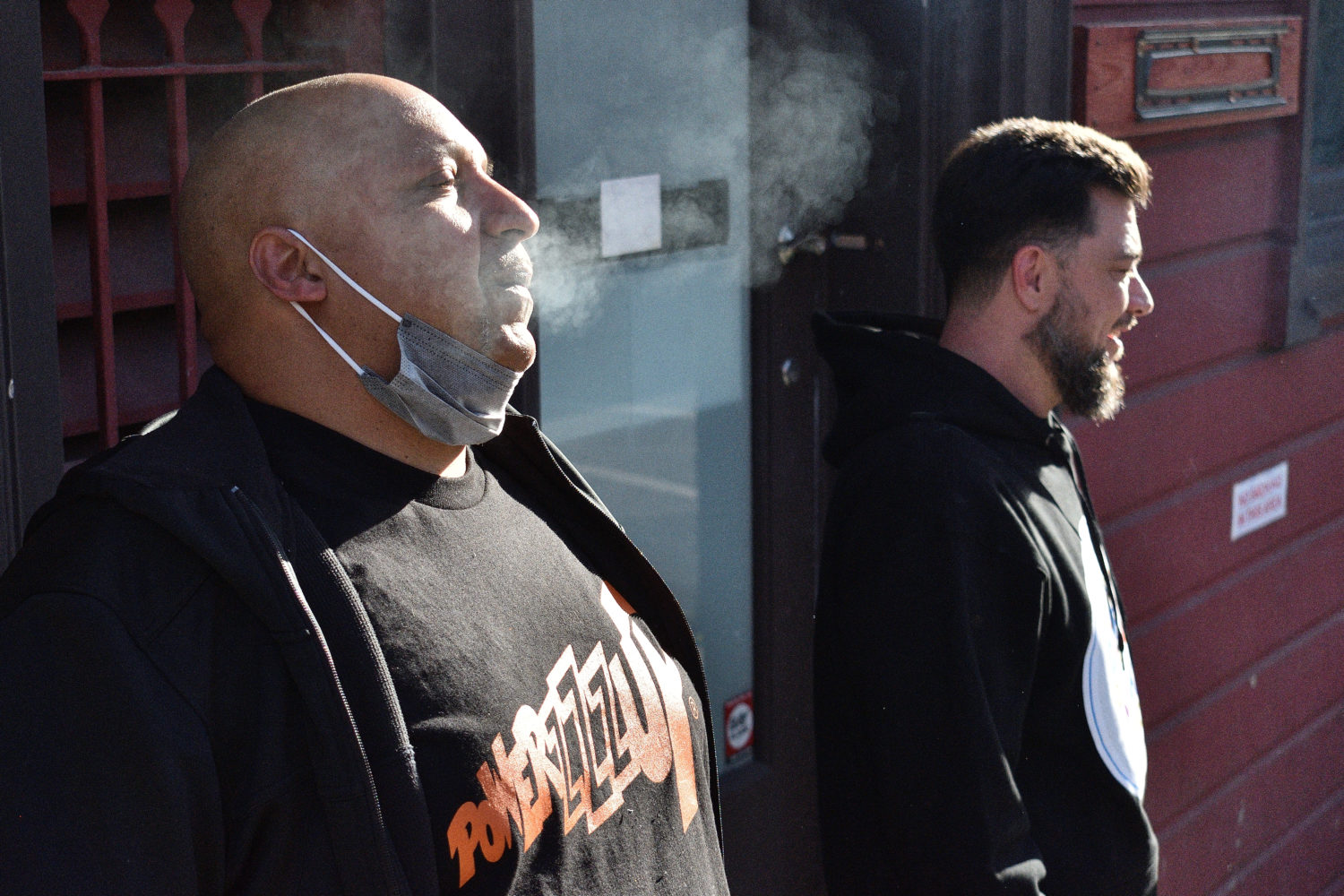
Powers and Mejia [Photo: Jimi Devine]
Powers says growing up in the Lower Haight gave him access. He got his start from a lesbian couple that lived down the street.
The conversation circled back to Snowman, the turning point in Meija’s grow game. “It’s when we really started playing around,” Mejia says, with Powers adding that the strain still holds up to this very day.
They started on a high with Snowman, but 15 more cuts are in the stable these days between the full production lines and the phenos they want to cross. Space limitations and the demand to pump out flower for their thirsty consumer base makes it tricky to hold too much.
We discussed how big the actual propagations were to find these now-famous cuts; that’s the number of seeds they popped to find the winning versions.
“[Big propagation] compared to what? Everywhere I see everybody else doing it. They’d be mad at us,” Powers laughs. “Because they’re like, ‘Well yeah we got a 1,300 seed plant hunt.’ I look at that and start laughing. That’s a lot of hunting to come back with nothing.”
Mejia countered with how much magic you could find in way fewer seeds.
“The Cereal Milk, for example – the cross is Snowman crossed to The Y. So is Gary Payton. So is Snow Montana. We got a couple more from the same batch of seeds,” Mejia says.
“We’re still bringing them out!” Powers exclaims.
“You can pop five of those motherfuckers; you’re going to find winners.” Mejia agrees.
The counterargument to big propagation is you might see all the expression in 20 plants. Some will lean towards the father plant; the others will favor the mother strain.
“I don’t agree with that,” Powers quickly snaps back at that 20 number.
“You probably need like 100 seeds. But you know, with our space considerations it’s more like 50 seeds at a time,” Mejia elaborates. “It’s just a time thing.”
We asked what strains under the Powerzzzup line took the most work to develop. The pair say none of them, because the ingredients they started off with were prime.
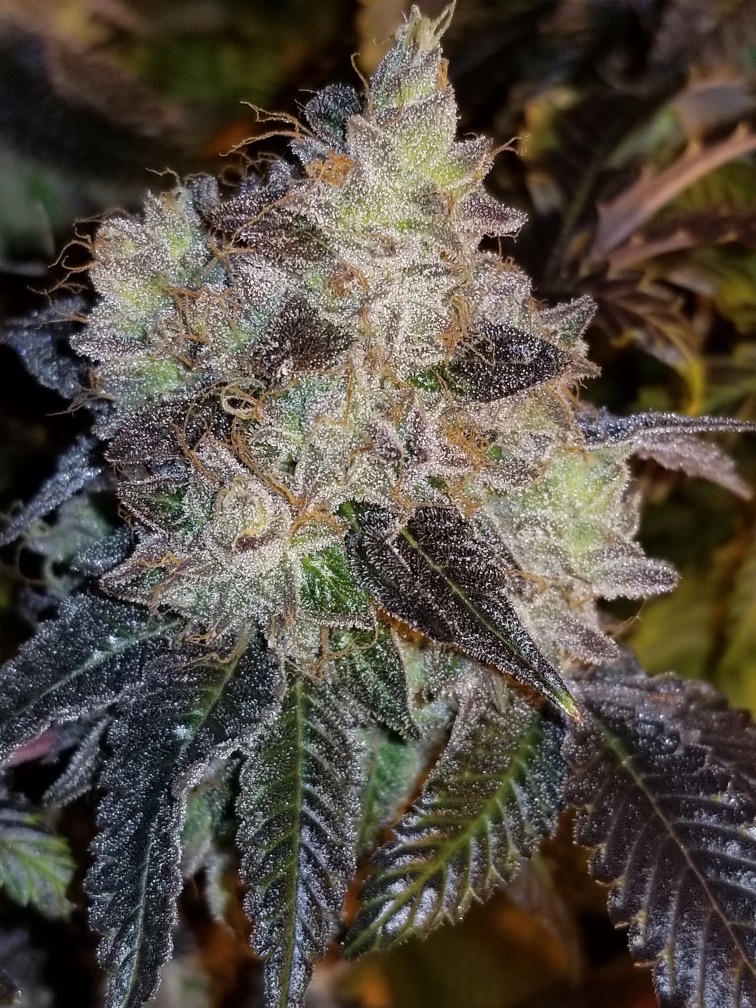
Cereal Milk [Photo Courtesy of Powerzzzup.]
Mejia understands the “stabilization for seed production” argument, but thinks that when stabilizing, you risk killing a strain’s luster.
Right now, the underground cannabis economy is flourishing. Apart from a lack of taxation, another theory as to the underground’s continued success is that the bottlenecks of the legal cannabis economy’s supply chain don’t allow the freshest versions of flower to get to market, and people don’t like dry flower.
“People complain about the dryness and everything. I don’t see why it’s an issue if facilities control temperature and humidity,” argues Mejia. “Why would it ever get to that point?”
Is it cool to see their genetics hold up in terms of shelf life, driving continued excitement over their strains despite facing the same challenges?
“But there is a lot of bullshit out there too, just to keep it real,” Powers says. “So many renames. I’m just tired of seeing old shit. I love herb. I want to see somebody else’s shit I would love to smoke. But at this point, it’s like just watching the same ship go by. Again.”
Mejia doesn’t think it’s always perfect. Some of their strains are picky.
“It takes a little experience to grow them. Sometimes places grow them and they’re not always perfect. We’re doing our best with quality control, making sure we’re living up to the name,” Mejia says.
Powers adds, “We’re trying to hand out layups. Don’t shoot that three! Shoot this perfect layup and get this money, that’s it. We have total package herb. We got terps, but we got power behind it.”
On the subject of terpenes, we ask what makes the best hash. Both reply “Snowman” in perfect unison.
How many strains over the years have they passed on, strains that they know other brands would have picked up?
“Hella throwaways other people would run,” Powers replies.
“All the time,” Mejia says of the frequency in which this happens.
Today, the genetics they’ve worked with or had on their radar control a dominant chunk of the market. The SF-bred Gelato strain alone controls a massive swath of the California market.
“I think it just makes us stronger,” Powers says. “We’ve had our foot, we’ve had our hands, in all this shit that is going on. People might get mad and say some shit about it but I tell him to keep it real. The majority [of things] you guys out there mess around with, we did that already, years ago.”
“And the thing that really helps us is there is no variety out there,” Mejia adds. “It’s all gelato-based, Sherb-based, it’s all shit we already did over and over to where it’s like nobody is bringing anything new to the table. With us, at least, our strains are related but they’re still different enough to where people are getting a whole different taste.”
Mejia went on to speak to the transition to the legal market.
“I mean the way we’re set up with Cookies, it’s been an easy transition,” Mejia says.
“I’ve been knowing Jigga [and] Berner. Shit, Berner use to come get weed from me too,” Powers adds.
Powers first met Jigga when the famed Cookies breeder was nine years old, playing sports together at the Fillmore Youth Center. While Jigga wasn’t a smoker at that age – he’s a bit younger than Powers – years later they would eventually pack up the corncob pipe after games. “He already knew what we were doing. What was I supposed to do?” Powers laughs.
Mejia says that while Jigga and Powers were linking up, he was smoking the brown frown brick weed from south of the border.
“Not me!” Powers snapped. “I never took the Brown Route. I can say that on everything that I love. I never have had to take the Brown Route. I was there on the expressway to some of the best herb on the planet at first. Even today, people don’t know what good herb is. That’s why I just give shit away.”
Powers explains that it’s not about the money, but rather exposing people to good flower.
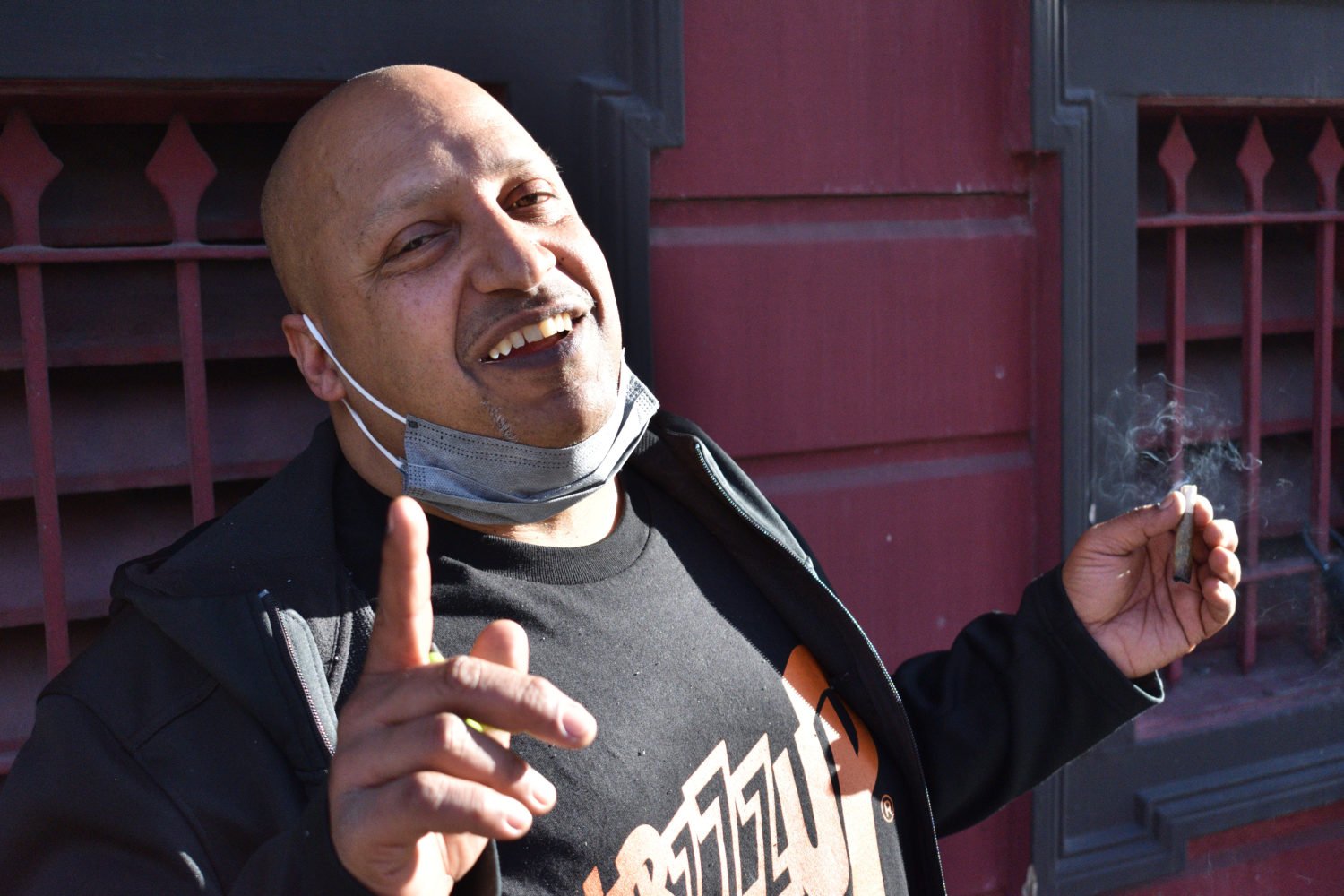
[Photo: Jimi Devine]
Can people really comprehend what the heat is? How many regular cannabis consumers have never even seen the real deal gas or grapes?
“I talk shit, but I try and educate,” Powers replies.
Mejia says it’s just been about providing for the real deal heavy smokers since day one. These people are spending $75 and he has no intention of letting them down.
On garbage weed, Powers says, “It don’t even get you to where what I use herb for. You know, to have deep mental thoughts and think about shit. Garbage herb won’t give you that, you won’t come up and be productive.”
Powerzzzup is very much viewed by the masses as an indoor entity. Has it ever been tempting to just give someone the cuts to run an acre and cash in on quantity?
“We get a chance to rock out with our friends, you know? That’s why we never even took that leap with somebody,” Powers says before alluding to the mountain of offers they’ve seen.
“But we’re going to do some more greenhouse shit this year, a lot of our stuff in a greenhouse looks indoor,” Mejia adds. Powers confirms that the operation will still be between friends.
But who grows their weed the best besides them?
“I won’t answer that now that I’m going on a tour,” Powers quips. But one thing that’s irritated him in his travels is the one feed grow style he’s seeing in operations scaling up. The Miss Universe contestants coming out of Powerzzzup certainly all aren’t on the same diet.
“They’re trying to use a one-feed, grow-all-kinds recipe which is bullshit,” Powers says. “Do your homework, just like we do on our end, before we give it to you. And if you got any questions, we can help you out to make you see the full potential of what this should really be like.”
But when people from an industrial-scale production background enter the industry, they don’t always take direction well.
“Sometimes it’s hard to talk to guys that are in good production, in a big production. There’s a lot of years [of knowledge] there. They might not say no to your face, but you can tell they don’t take well to advice,” Mejia says.
“I just want you to win,” Powers adds. “To be a part of this history that’s going to be fucking amazing.”
Powers says that some of these people don’t realize that the money doesn’t come first. What comes first is falling in love with the flower they’ve got in the game.
“As soon as somebody starts talking about money first, I’m turned the fuck off. I’m walking the other way,” he laments.
Mejia says some will hit them with bottom line comments when they’re just trying to help get their nutrients up to par. “Fuck your bottom line and fuck you,” Powers interjects.
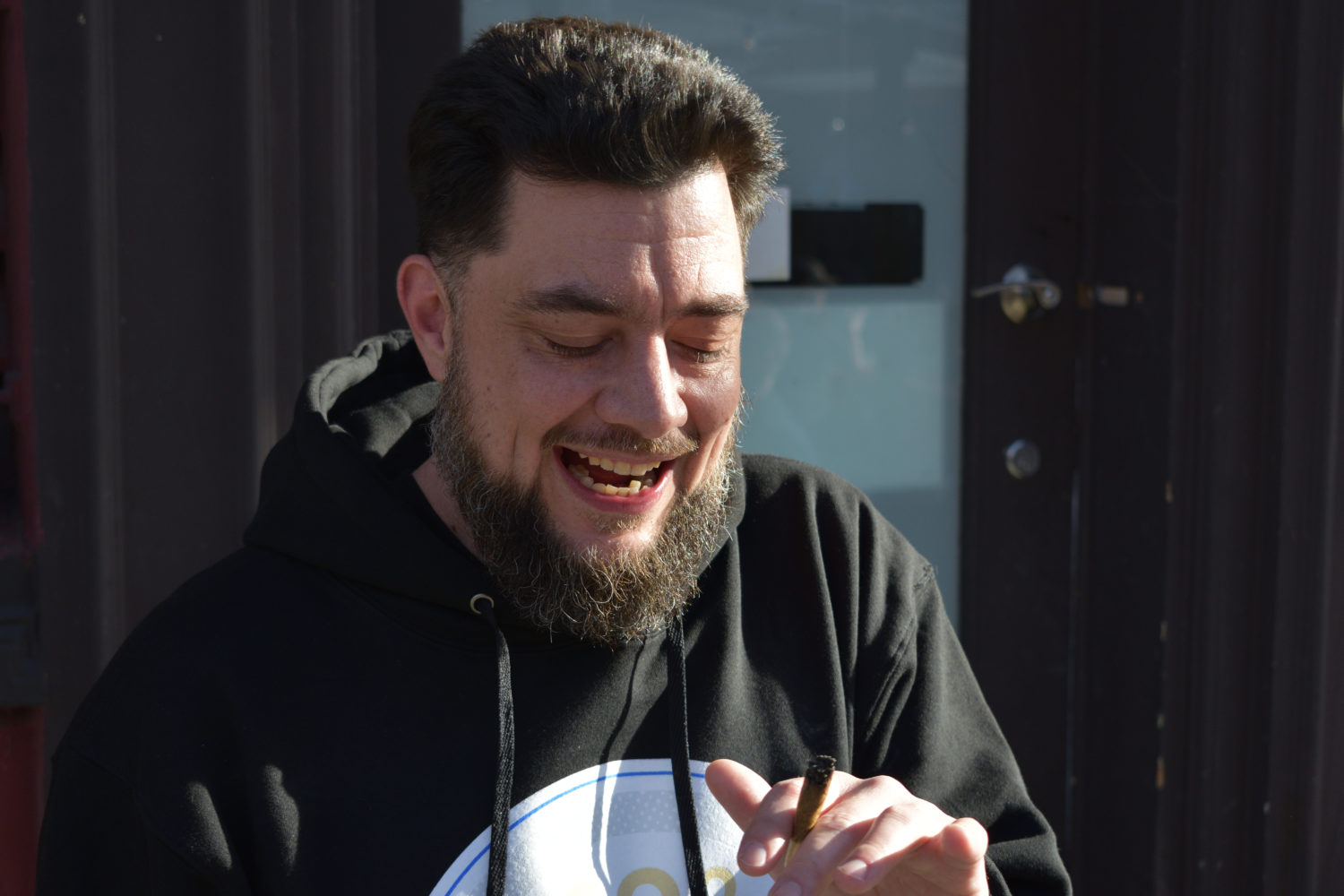
[Photo: Jimi Devine]
“I’m like fuck that, I’m a winner,” says Powers. “Even when you hoop, you get older, you’re not going to be able to run as fast and jump as high, but you learn other ways to win. That’s what we’re doing here, we’re going for the win baby. I don’t care if I’m 4 for 25 this game. When it’s all said and done, did we win? That’s it.”
They don’t have to do a lot of smoothing over with the people they actually work with, but Powers believes the lessons learned from “snake-ass people” were critical to cultivating what they’ve created. “But I’ve seen your skin shed. I’ve seen all this shit. I’m looking at everything,” Powers warns.
Are the biggest winners in cannabis just the best judge of character? Be it those with good intentions or bad intentions.
“Oh yeah, character is what it is man. What the bottom line is, what a person is, is character,” Powers agrees. “The shit I seen Bern do was amazing. He didn’t have to give Jigga half of Cookies like he did. He could have gave a nice chunk and Jigga probably would have been like, ‘amazing!’ But no, he was like fuck, ‘Here’s half of Cookies, it’s yours.’ That’s real shit. You’re talking about 25 or 30…” Powers says, pondering a number.
Generational wealth, we ask?
“Exactly. Real shit that will put you on the map forever,” he confirms.
Powers says it’s crazy to see the dues his circle paid create so much opportunity for so many at every level of cannabis. “A lot of people don’t think about it, as you know, that being a part of it. But look how many people might have paid rent, pay the mortgage, pay the college tuition for their own kids or whatever it may be, you know?”
The Powerzzzup Team certainly looks to be some of the most coveted pot in the country when interstate pot commerce opens up. Their thoughts?
“Shit, we’re going to be worldwide baby. The herb can speak for itself. Bern can prop it up. But once you get it you know,” Powers says, not trying to take away from what Berner does for the squad. “I love little brother for the platform he gives us. I ride with him and he rides with me. Jigga as well. Those are my little brothers before any of this jumped off.”
Advertising disclosure: We may receive compensation for some of the links in our stories. Thank you for supporting LA Weekly and our advertisers.

